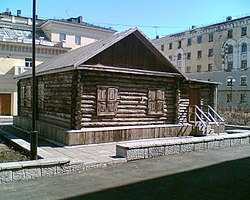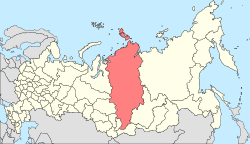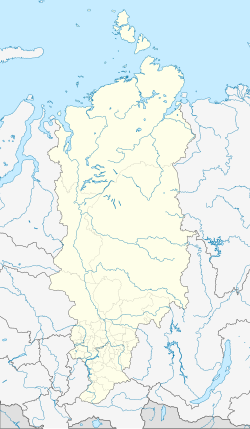Norilsk
| Norilsk (English) Норильск (Russian) |
|
|---|---|
| - City - | |
 The first house built in Norilsk, in 1921 |
|
 Location of Krasnoyarsk Krai in Russia |
|
|
|
|
|
|
|
|
|
|
| Administrative status (as of January 2014) | |
| Country | Russia |
| Federal subject | Krasnoyarsk Krai |
| Administratively subordinated to | krai city of Norilsk |
| Administrative center of | krai city of Norilsk |
| Municipal status (as of December 2004) | |
| Urban okrug | Norilsk Urban Okrug |
| Administrative center of | Norilsk Urban Okrug |
| Statistics | |
| Population (2010 Census) | 175,365 inhabitants |
| - Rank in 2010 | 102nd |
| Time zone | KRAT (UTC+07:00) |
| Founded | 1935 |
| City status since | 1953 |
| Postal code(s) | 663300-663341 |
| Dialing code(s) | +7 3919 |
|
|
|
| on | |
Norilsk (Russian: Норильск; IPA: [nɐˈrʲilʲsk]) is an industrial city in Krasnoyarsk Krai, Russia, located above the Arctic Circle, east of the Yenisei River and south of the western Taymyr Peninsula. It has a permanent population of 175,000. With temporary inhabitants included, its population reaches 220,000.
Norilsk was closed in November 2001 to all non-Russians, except for Belarusians.
It is the world's northernmost city with more than 100,000 inhabitants and the second largest city (after Murmansk) inside the Arctic Circle. Norilsk, Yakutsk, and Vorkuta are the only large cities in the continuous permafrost zone.
Norilsk was founded at the end of the 1920s, but the official date of founding is traditionally 1935, when Norilsk was expanded as a settlement for the Norilsk mining-metallurgic complex and became the center of the Norillag system of GULAG labor camps. It was granted urban-type settlement status in 1939 and town status in 1953.
Norilsk is located between the West Siberian Plain and Central Siberian Plateau at the foot of the 1,700-meter (5,600 ft) high Putoran Mountains, on some of the largest nickel deposits on Earth. Consequently, mining and smelting ore are the major industries. Norilsk is the center of a region where nickel, copper, cobalt, platinum, palladium and coal are mined. Mineral deposits in the Siberian Craton had been known for two centuries before Norilsk was founded, but mining began only in 1939, when the buried portions of the Norilsk-Talnakh intrusions were found beneath mountainous terrain.
...
Wikipedia



